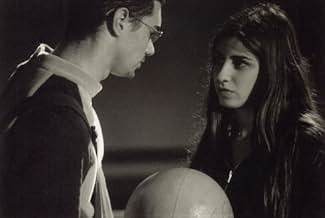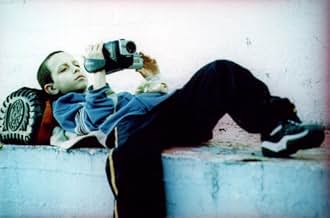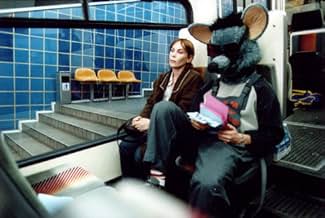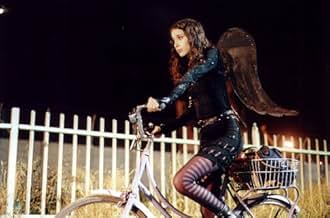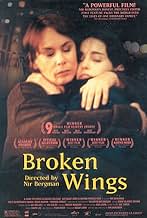IMDb RATING
7.3/10
2.6K
YOUR RATING
Daphne and her four children try to cope with the abrupt death of husband/father. As the family seems to fall apart, a sudden incident gives them a chance to heal their 'broken wings'.Daphne and her four children try to cope with the abrupt death of husband/father. As the family seems to fall apart, a sudden incident gives them a chance to heal their 'broken wings'.Daphne and her four children try to cope with the abrupt death of husband/father. As the family seems to fall apart, a sudden incident gives them a chance to heal their 'broken wings'.
- Awards
- 16 wins & 4 nominations total
Orly Silbersatz
- Dafna Ulman
- (as Orly Silbersatz Banai)
- Director
- Writer
- All cast & crew
- Production, box office & more at IMDbPro
Featured reviews
There seems to be a whole genre of films recently ,the theme of which is young people's daunting search for purpose in life in a world where external sources of values are no longer accepted. I am thinking of "Garden State," "I Heart Huckabees," "Closer " etc. The consensus, so to speak, if these movies are to be taken as a mirror of reality, is that there is no purpose to be found, and the only grounds for relating to other human beings at all is sexual attraction, or its concomitant sexual competition. In fact, I watched this film and "Thirteen" together, and found them strangely parallel. I mention all this because Knafayim Shvurot is different from all the others in a small but fundamental respect: here the characters have not quite given up the search. Perhaps this reflects a difference between Israeli culture which, jaded though it is, is indisputably younger, and American culture which seems to be declining into both hedonism and vicious religiosity. I didn't realize it while I was watching, but was somehow not surprised to notice afterward that the "family" of characters is played by a real-life family. I couldn't help wondering how the experience affected them...
"Blackbird singing in the dead of night. Take these broken wings and learn to fly. All your life, you were only waiting for this moment to arise." - Paul McCartney
The trauma that accompanies the sudden loss of a beloved family member is being repeated all over the Middle East today in both Israeli and Palestinian homes. Behind the headlines, however, is the human tragedy, the stories we never read about. This story is told metaphorically in Nir Bergman's brilliant first effort Broken Wings. It is not an overtly political film, but the implications are clear. Set in the Israeli port city of Haifa, it depicts the effect of the loss of the family's patriarch on each member of the Ulman family, perhaps suggesting the emotional state of Israel since the murder of Yitzhak Rabin. The 83-minute film won accolades at the Berlin International Film Festival and has been a huge critical and commercial success in Israel, winning nine Israeli Academy Awards in 2003.
Beautifully expressive Maya Maron in her first feature role is an Israeli teenage singer-songwriter (also named Maya) who dreams of becoming a rock star and wears wings when she sings in her local band. As the film opens, Maya is singing a song she wrote in memory of her father who died suddenly nine months ago, for reasons not disclosed until the end of the film. Her song is interrupted when her mother Dafna (stage actress Orly Zilberschatz-Banai), a nurse, phones and tells her that she has been called to work on the night shift at the local hospital and needs Maya home to take care of brother Ido (Daniel Magon) and sister Bahr (Eliana Magon). Maya emphatically refuses then relents but the tension between mother and daughter is palpable. Maya, who was with her father when he died, does not fully grasp the guilt behind her bottled-up rage and takes out her anger on her mother who is both irritating and sympathetic as she labors wearily to keep the family from a collision course.
We learn that each family member is suffering the father's loss in his or her own way. Dafna stayed in bed for three months leaving the children to do the parenting and the results are reflected in their erratic behavior. Six-year old Bahr wets her bed and Ido carries out a strange ritual of filming himself while jumping into an empty pool. The oldest brother Yair (Nitai Gaviratz), also a teenager, has been suspended from school and hands out leaflets on commuter trains dressed in a mouse costume while expressing a nihilistic philosophy to anyone who will listen. His inability to respond to the words father, fear, and anger during a word association test prompts his school counselor to deny him re-admittance until he receives treatment, but he does not help his cause when he tells the counselor "Your words are meaningless. This conversation does not exist and you don't exist."
Yair tells Maya that "things could be worse", and they do get worse before they get better. In fact, the catalyst for redemption comes in a life-threatening accident that allows the family to regroup, take responsibility for their lives, and begin the process of healing. Broken Wings sounds depressing but in the hands of the skillful direction of Mr. Bergman its sadness is balanced with humor and the strength and dignity of its characters. The film does not break any new ground but displays the kind of insight that allows us to learn something new about ourselves. Though rooted in reality, Broken Wings has a heart that leaps and a soul that soars and is a film that I truly loved.
The trauma that accompanies the sudden loss of a beloved family member is being repeated all over the Middle East today in both Israeli and Palestinian homes. Behind the headlines, however, is the human tragedy, the stories we never read about. This story is told metaphorically in Nir Bergman's brilliant first effort Broken Wings. It is not an overtly political film, but the implications are clear. Set in the Israeli port city of Haifa, it depicts the effect of the loss of the family's patriarch on each member of the Ulman family, perhaps suggesting the emotional state of Israel since the murder of Yitzhak Rabin. The 83-minute film won accolades at the Berlin International Film Festival and has been a huge critical and commercial success in Israel, winning nine Israeli Academy Awards in 2003.
Beautifully expressive Maya Maron in her first feature role is an Israeli teenage singer-songwriter (also named Maya) who dreams of becoming a rock star and wears wings when she sings in her local band. As the film opens, Maya is singing a song she wrote in memory of her father who died suddenly nine months ago, for reasons not disclosed until the end of the film. Her song is interrupted when her mother Dafna (stage actress Orly Zilberschatz-Banai), a nurse, phones and tells her that she has been called to work on the night shift at the local hospital and needs Maya home to take care of brother Ido (Daniel Magon) and sister Bahr (Eliana Magon). Maya emphatically refuses then relents but the tension between mother and daughter is palpable. Maya, who was with her father when he died, does not fully grasp the guilt behind her bottled-up rage and takes out her anger on her mother who is both irritating and sympathetic as she labors wearily to keep the family from a collision course.
We learn that each family member is suffering the father's loss in his or her own way. Dafna stayed in bed for three months leaving the children to do the parenting and the results are reflected in their erratic behavior. Six-year old Bahr wets her bed and Ido carries out a strange ritual of filming himself while jumping into an empty pool. The oldest brother Yair (Nitai Gaviratz), also a teenager, has been suspended from school and hands out leaflets on commuter trains dressed in a mouse costume while expressing a nihilistic philosophy to anyone who will listen. His inability to respond to the words father, fear, and anger during a word association test prompts his school counselor to deny him re-admittance until he receives treatment, but he does not help his cause when he tells the counselor "Your words are meaningless. This conversation does not exist and you don't exist."
Yair tells Maya that "things could be worse", and they do get worse before they get better. In fact, the catalyst for redemption comes in a life-threatening accident that allows the family to regroup, take responsibility for their lives, and begin the process of healing. Broken Wings sounds depressing but in the hands of the skillful direction of Mr. Bergman its sadness is balanced with humor and the strength and dignity of its characters. The film does not break any new ground but displays the kind of insight that allows us to learn something new about ourselves. Though rooted in reality, Broken Wings has a heart that leaps and a soul that soars and is a film that I truly loved.
Going into this movie i had little knowledge regarding the film just the basic plot and that it had won some awards in Israel. In fact it's the first ever Israeli film i've ever seen.
Looking at the rather simple plot line I was worried that it would be too boring. I gotta say that despite the simple plotline that it was still rather meaningful as I'm sure many families around the world experience such trials in their lives. Parents and their children fighting even over the smallest things.
I just thought they could have expounded a little more on the lives of the family after the death of the father. Indeed too short at 80 mins. I thought the acting was pretty good especially from the two lead actresses. You could really feel the tension between the two as they argue.
Nice film overall with good acting performances
Looking at the rather simple plot line I was worried that it would be too boring. I gotta say that despite the simple plotline that it was still rather meaningful as I'm sure many families around the world experience such trials in their lives. Parents and their children fighting even over the smallest things.
I just thought they could have expounded a little more on the lives of the family after the death of the father. Indeed too short at 80 mins. I thought the acting was pretty good especially from the two lead actresses. You could really feel the tension between the two as they argue.
Nice film overall with good acting performances
"Broken Wings (Knafayim Shvurot)" is a frank, involving portrait of a family coping with grief and stress.
Even more than such films as "Ordinary People," debut writer/director Nir Bergman has a sure touch in showing us the pressures and responses of a full range of individual family members, from the depressed working mother to her children -- five year old daughter, ten year old son, and and their teen brother and sister.
Within very realistic crowded and complicated living, working, school, and peer friendship environments, we see each as distinct individuals with guilts, needs, issues, and talents, and as the dependent members of a family unit dealing with past and present pain and crises, including through music.
I don't know the technicalities of the film stock, but the grittiness of the cinematography contributes to the naturalism, as well as the un-Hollywood, un-pretty look of the actors.
As an Israeli film what also adds to how touching it is is its non-political, non-geographically-necessary-specific content. This is just a beautiful human story of love and responsibility.
While the opening credits are bilingual Hebrew and English, the closing credits, annoyingly, are not.
Even more than such films as "Ordinary People," debut writer/director Nir Bergman has a sure touch in showing us the pressures and responses of a full range of individual family members, from the depressed working mother to her children -- five year old daughter, ten year old son, and and their teen brother and sister.
Within very realistic crowded and complicated living, working, school, and peer friendship environments, we see each as distinct individuals with guilts, needs, issues, and talents, and as the dependent members of a family unit dealing with past and present pain and crises, including through music.
I don't know the technicalities of the film stock, but the grittiness of the cinematography contributes to the naturalism, as well as the un-Hollywood, un-pretty look of the actors.
As an Israeli film what also adds to how touching it is is its non-political, non-geographically-necessary-specific content. This is just a beautiful human story of love and responsibility.
While the opening credits are bilingual Hebrew and English, the closing credits, annoyingly, are not.
Maya is a teenager who has hopes of someday having a better life through her singing. However, on the night of her first gig she is called home to look after her young brother and sister while her mother goes to a night-shift at the hospital. This is the pattern of Maya's life since her father died about 9 months before her mother Dafna never seems to be around, her elder brother seems to be on a downward spiral of depression while the youngest children seem adrift and distant.
Whenever I sit down to watch a film that comes from Israel, it is tempting to assume that the film will deal with or at least touch on the troubles there. That was the case with this film and I was pleasantly surprised that this was actually a drama about teenage relationships and difficulties. The plot focuses on Maya but draws in the other characters into a story that is rather low-key and small but manages to be involving and rather moving. It's not perfect of course and some viewers may find it's pace a little slow and the insular nature of the drama to be a little folded in on itself (especially if you expected the wider conflicts to be drawn into it in some way). As a teenage drama this is rather touching and is an enjoyable little drama that is based on a well written script.
The performances are also very good and there aren't really any weak links in this regard. Maron is well cast and her Maya is interesting and sympathetic. Banar has a more difficult role but does it well and keeps the audience with her. Gaviratz is good even if his character is the most difficult to get to know; the younger children are also good and rise above the usual cute performances that Hollywood seems to draw from kids on a regular basis. The film paints a small family drama on a little canvas and the good cast are a major part of producing a story that really engages.
Overall this is an enjoyable little family drama that is quite involving and quite touching. The characters are well written and well delivered by a roundly good cast. Short and bittersweet and well worth a watch if you can find it everywhere in the world there are families and teenagers and everywhere in the world they have conflict.
Whenever I sit down to watch a film that comes from Israel, it is tempting to assume that the film will deal with or at least touch on the troubles there. That was the case with this film and I was pleasantly surprised that this was actually a drama about teenage relationships and difficulties. The plot focuses on Maya but draws in the other characters into a story that is rather low-key and small but manages to be involving and rather moving. It's not perfect of course and some viewers may find it's pace a little slow and the insular nature of the drama to be a little folded in on itself (especially if you expected the wider conflicts to be drawn into it in some way). As a teenage drama this is rather touching and is an enjoyable little drama that is based on a well written script.
The performances are also very good and there aren't really any weak links in this regard. Maron is well cast and her Maya is interesting and sympathetic. Banar has a more difficult role but does it well and keeps the audience with her. Gaviratz is good even if his character is the most difficult to get to know; the younger children are also good and rise above the usual cute performances that Hollywood seems to draw from kids on a regular basis. The film paints a small family drama on a little canvas and the good cast are a major part of producing a story that really engages.
Overall this is an enjoyable little family drama that is quite involving and quite touching. The characters are well written and well delivered by a roundly good cast. Short and bittersweet and well worth a watch if you can find it everywhere in the world there are families and teenagers and everywhere in the world they have conflict.
Did you know
- TriviaIdo and Bahr are played by real-life brother and sister Daniel and Eliana Magon.
- ConnectionsFeatured in Noodle (2007)
Details
Box office
- Gross US & Canada
- $421,454
- Opening weekend US & Canada
- $24,862
- Mar 14, 2004
- Gross worldwide
- $760,318
Contribute to this page
Suggest an edit or add missing content







